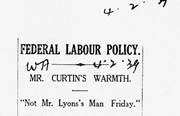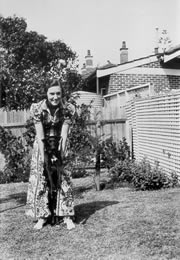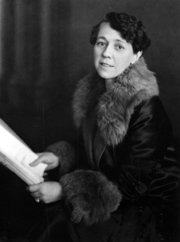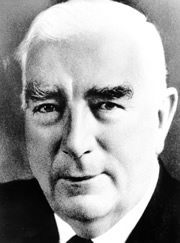

![]()
JCPML Records of Walter James. Letter to Sir Walter James from John Curtin thanking him for birthday wishes. 8 January 1939. JCPML00027/2.
Courtesy of the State Library of New South Wales: ML MSS 412/8.
John Curtin's birthday. Receives birthday wishes from Sir Walter James, and sends him a reply.
Issues statement on defence and sends telegram to Prime Minister Lyons requesting that Parliament be immediately summoned.
‘Amplifying the reasons for his telegram Mr Curtin said: “I take it that Mr Lyons means exactly what he said. He has told us the peace that Australia has enjoyed for 150 years is threatened. These words mean a very different kind of war to the world war, in which Australia participated in 1914-18. The only construction common sense can place upon them is that for the first time in our history we have to confront the hazard of actual aggression against our soil and the lives of our people.”
“Clearly the Commonwealth Parliament,” Mr Curtin said, “should meet immediately.”’ 2
JCPML. Records of Arthur Calwell. "Federal Labour Policy", West Australian, 4 February 1939. JCPML00694/1/19.
Courtesy National Library of Australia: MS 4738, Series 21, Box 74.
Attends farewell to Mr M F Troy and Mrs Troy. ‘…on the eve of their departure for London, where Mr Troy will take up the position of Agent General for Western Australia.
A vocal and instrumental presentation preceded the speechmaking and among those who contributed to the entertainment of guests were members of the Labor Women’s Choral Union.
…The Federal Leader, Mr Curtin, said there should be no sadness at the departure of Mr Troy. Since the arrival of Mr Troy in Western Australia over 40 years ago he had served the workers of the State, and he was now going to London to promote the same thing he had promoted here – the welfare of his fellow-men and women. The office which Mr Troy would now hold was a derivative of the offices he had he had already held…’ 4
JCPML Records of the Curtin Family. Elsie M Curtin and Kip the dog, February 1939. JCPML00382/62
Makes statement on defence works and finance. 5
At home with family in Cottesloe.
Makes a ‘fighting speech’ at the opening by Premier J C Willcock of the metropolitan campaign for the Labor Party.
‘Tracing the history of the State back 15 years, he exposed the platform tactics of opponents, and then passed on to a consideration of the serious problems of the day. His final point was that the two States which were consistently Labor were the most prosperous of the Commonwealth today.’ 68.15 pm
Broadcasts on 6AM and 6PM, in support of Labor candidates in the forthcoming State elections. 9
Pays ‘a feeling’ tribute to May Holman MLA ‘Australian Labor’s pioneer woman parliamentarian’ who died as a result of injuries sustained in a car accident on Friday 17 March.
‘Her memory will have a precious place in the annals of our cause.’ 11
JCPML. Records of the Australian Labor Party WA Branch. May Holman, n.d. JCPML01137/4
Attends funeral of May Holman which was:
‘… in many ways the most outstanding State funeral that has ever been conducted in WA. The best proof that it was a people’s tribute to a great woman is seen by the fact that the people attended in their thousands. Everywhere, as one passed among them to the graveside, one could hear hushed whispers about her goodness to this one and that, her affectionate nature and smile for everyone, her willingness to use her wonderful musical gifts, for any worthy cause, and to spend her own money in doing it; to her great love for her mother, brothers and sisters; her work for better conditions in respect of wages and hours and housing facilities for the basic wage workers. The usual funeral is a silent affair, but in this case the people seemed to be so overwhelmed that they had to talk about the great loss that all had sustained. In this phase the hearts of the people seemed to be laid bare. To look around that vast assemblage was to discover that people from all over the State were there….’
Evening
Broadcasts a ‘magnificent tribute to a great Labor Woman’, May Holman.
Chairs meeting of Federal Parliamentary Labor Party.
‘Mr Curtin expressed profound regret at the death of Mr Frank Baker [killed in a motor accident on 28 March] and emphasised the splendid service he had rendered during his association with the Federal Parliamentary Labor Party. Deep sorrow was felt for the widow and children of the deceased and this Party tenders sincere condolence to the bereaved. Members stood in silence.’ 1410.30 am? – 1.20 pm
Chairs meeting of Federal Parliamentary Labor Party.
‘Mr Forde reported that the Executive had met that morning and recommended: The Leader of the Party gave notice at the sitting of the House of Representatives today his intention of moving a no confidence motion against the government.
Debate ensued. The motion for the adoption of the Executive’s recommendation was defeated.’ 19Chairs meeting of Federal Parliamentary Labor Party.
‘GRANT TO DAME ENID LYONS
Mr Curtin expressed his views thereupon and indicated his belief that the amount should be £500 per annum. Mr Holloway considered £500 too much… Mr Ward raised a point of order as to whether members would be bound by a majority decision of the party. Mr Curtin ruled that unless the government made it a vital issue members would be entitled to urge their own view point. … It was ultimately resolved to leave the matter an open question.’ 20Chairs meeting of Federal Parliamentary Labor Party.
‘Mr Curtin explained the Bill for an Annuity for Dame Enid Lyons and suggested an amendment. … Mr Curtin made a statement regarding the amounts to widows of other deceased members.’ It was agreed [15 for and 9 against] that ‘a committee representing all parties be appointed to investigate the financial position of Mrs Lyons and report again.’10.30 am? – 12 noon
Chairs meeting of Federal Parliamentary Labor Party. 31
Is entertained at dinner by the Federal Parliamentary Labor Party.
‘Tributes were paid to Mr Curtin’s qualities as a leader and to the marked advance the party has made during his term.’ 33Writes article on the significance of the date:
‘Today, July 9, 1939, is a significant day in the history of this Commonwealth. To my mind, the development of Australia being what it is, there can be can be no date charged with greater significance in the whole calendar.
For it was on July 9, 1900, that Her Majesty, Queen Victoria gave the Royal Assent to the Commonwealth of Australia Constitution Bill as finally passed by the House of Lords and Commons.
…
The living institution of government, and not the skeleton of a decades-old Constitution is the requisite of our time.

JCPML. Records of the Government Photographic Service. Sir Robert Gordon Menzies, KT,PC,CH (1894-1978) Prime Minister 1939-1941, 1949-1966. JCPML00036/11.
Courtesy Government Photographic Service.
Prime Minister Menzies commits Australia to war.
Has interview with Prime Minister Menzies.
‘Mr Curtin in a statement afterwards, said that Mr Menzies had informed him as fully as he could of the position regarding the Empire and the international situation.
“I recognise the gravity of the occasion,” added Mr Curtin, “and informed Mr Menzies that in the event of war the Labor Party could be relied upon to do the right thing for the defence of Australia and the integrity of the British Commonwealth of Nations. The rest of the conversation was of a confidential nature and is not completed.”’ 41‘We stand for the defence of Australia to the greatest degree of which we are capable, and for the maintenance of the British Commonwealth of Nations.’ 42
Chairs meeting of the Federal Parliamentary Labor Party at which he makes ‘a statement on the international situation and his interview with Mr Menzies. .. Reads a declaration on the war situation which had been endorsed by the executive:’
‘DECLARATION CONCERNING THE WAR
The draft of the recommendation with certain amendment as here follows was carried unanimously.
The Australian Labor Party affirms its traditional horror of war and of its belief that international disputes should be settled by arbitration.
It deplores the fact that force instead of negotiation and discussion has plunged the peoples into war. It believes that resistance to force and armed aggression is inevitable if attacks on free and independent peoples are to be averted. In this crisis, facing the reality of war, the Labor Party stands for its platform. That platform is clear. We stand for the maintenance of Australia as an integral part of the British Commonwealth of Nations. Therefore, the party will do all that is possible to safeguard Australia, and at the same time having regard to its platform, will do its utmost to maintain the integrity of the British Commonwealth.
As to the conduct of Australian affairs during this unhappy period, the Australian Labor Party will preserve its entity. It will give support to measures having for their object the welfare and safety of the Australian people and of the British Commonwealth of Nations.
We take the view that these measures should include the immediate control by the Commonwealth Government of all essential raw materials and the resumption by the Government of the factories associated with the production of munitions and war equipment.
There must be a rigid control of commodity prices and house rents so that war-profiteering will become impossible. Interest rates must be kept within bounds and the monetary system readjusted so that the National Debt be kept as low as possible.
The democratic rights of the people must be safeguarded to the maximum. The very minimum of interference with the civic liberties of the people should be the objective of the Government in carrying through its measures for national security. To ensure that this be done, it is essential that the Parliament of the Commonwealth should remain in session.’
[Curtin’s speech to the House on 6 September included a statement that was identical to this one.] 4310.30 am - ?
Chairs meeting of Federal Parliamentary Labor Party.
Comments on the Trading with the Enemy Bill 1939, agreeing with the principle but objecting to a provision which allows certain trading to continue with the enemy subject to ministerial approval.
Speaks on the National Security Bill 1939, and while accepting the need for such legislation calls for a limit on the effect of the legislation to a specific period to allow parliamentary review. 45Raises objections concerning national security – the lack of appeal for persons detained under the legislation and to the provision that allows the Government to legislate on any matter outlined in the Bill and on matters not specified in the Bill.
Expresses concern about the wide-ranging power of the legislation and asks for a regular review by Parliament.
Outlines the Opposition’s objections to provisions in the National Security Bill which gives Government the right to amend or annul parliamentary legislation. 46
Criticises the Government on the Budget 1939-1940, for the basis on which it obtains its revenue. Makes points about the level of indirect taxation, the reduction of land tax and the loans policy of the Government. Calls for more employment initiatives by the Commonwealth and suggests that Australia works to provide excess food supplies to Great Britain. 49
10.30 am? – 1 pm
Chairs meeting of Federal Parliamentary Labor Party. 50
Points out anomalies in the application of the legislation in Gold Tax Collection Bill.
Suggests that the Gold Tax is unfair as it is applied only to the gold industry and not to other industries making greater profits due to the war. Proposes tax on profits rather than on a margin over an arbitrary price. 51Chairs meeting of Federal Parliamentary Labor Party. Explains that:
‘The Executive had further deliberated on the question of a Committee to watch regulations issued under the National Security Act and now recommended that every member of the Party should carefully scrutinise each regulation as issued and if an official protest was to be made in respect of any regulation deemed to infringe civil liberty or suppressive in its form acting injuriously to the working classes interests or rights, then such protest to the government should be made after consultation with the Leader or/and the Deputy Leader of the Party, but this should not be construed to mean that members were unable to make public pronouncements to Party branches or at public meetings. Members were free to make such protests as their individual opinion but it was urged for the sake of Party unity the utmost collaboration should be sought with the Leader and Deputy Leader when official Party protests were to be registered thereupon.’ 52Speaks on the Defence Bill (No. 2) 1939, and stressing opposition to conscription and provision for conscientious objection.
Accepts the necessity of the Loan Bill 1939 but suggests that part of the sum should be available through Australian banking and finance institutions. 53Returns to Perth.
Addresses annual meeting of the WAN Chamber of Manufacturers on the need for national unity.
![]()
Announces his intention of travelling to the Eastern States ‘…because Mr Menzies has asked me to meet him. I shall with the utmost expedition place myself at his disposal’. 55
? – 5.35 pm
Chairs meeting of Federal Parliamentary Labor Party. Makes ‘statement to the Party regarding the procedure likely to be taken by the Government, a series of statements by Ministers would probably be made on various aspects of the war effort and defence projects’. 60
10.30 am? – 12.55 pm
Chairs meeting of Federal Parliamentary Labor Party.
7.30 pm – 9.20 pm
Chairs meeting of Federal Parliamentary Labor Party.
Chairs meeting of Federal Parliamentary Labor Party.
Provides the Federal Country Party with an opportunity to make a stand for ‘those who they claim to represent in the national Parliament – and to a man they ran away.’
‘Curtin says CP “squibbed it.”
‘Proceedings in the House of Representatives … confirm the opinion… that the threat by farmers and their political mouthpieces to force the Menzies Government to the country on the wheat price issue is mere shadow fighting.’ 6410.30 am? – 1.25 pm
Chairs meeting of Federal Parliamentary Labor Party.
Speaks on the need for unity in the Labor Movement:
‘The paramount thing in this war is that, however the war ends, its termination must see in Australia a united, well-organized, clear-thinking, labor movement, so that the trophies of victory won’t just be for non workers … War might smash this party again – conscription would tear us apart as before – we may get our political opportunity and wedges will be driven in our ranks by every militant, every militarist, every politician, every opportunist. We – Australia – you – the Party – me – the Movement – we’re all threatened. There’s a shadow over the world – civilization is tearing itself to pieces and nothing we can do will aid survival – our Movement will crumble – just as we are building the Party again. And so we must give all we can do to the immediate fight for Government; in political victory may come a last desperate chance.’ 66Comments on Labor’s attitude to war.
‘Labor, he said, construed the problem of the British Empire as one in which each dominion had a major responsibility. That was to ensure complete capacity for resistance of an attack against the territory for which it was responsible.’ 68Arrives in Perth from Eastern States.
Attends last meeting of the year of the State Executive, together with Senators J Cunningham and J M Fraser. 71
‘Special Christmas and New Year Message from the Leader of the Labor Party: Mr John Curtin
In my message a year ago, I expressed the fervent hope that Australia in 1939 would progress towards a better and freer life for its people and that a greater measure of happiness would be the lot of the masses. Unhappily that has not been the case.
We are now on the threshold of 1940. What it will produce is not known. All the portents are black with doubt and uncertainty. The terrors of war indicate that misery, suffering and death await many of our people and of the peoples of the world.
Time, the reaper, has gathered another year. Death, the Grim Reaper, stalks hand in hand with the prosecution of war – a war not of our making and beyond our power to avert.
The heavy burden of debt from the last war; the legacy of malnutrition and broken morale from the depression and the halting of social reform under non-Labor Governments have had their weakening incidence. To meet either the physical strain of war or the mental hardships imposed by its implications, definite social and economic policy must be invoked as fundamental to the development of the full power of the Commonwealth.
I look to 1940 with one dominating hope. That hope is that peace will come again during the ensuing 12 months; that reason and human brotherhood will replace force and aggression. A just peace for an unhappy world is a New Year’s Gift the peoples of the world desire and need.
The Australian Labor Party has exerted its every energy in 1939 towards the realisation of its ideals. During 1940 it will have the verdict of the people pronounced upon its record. I await that verdict with every confidence and I say to the Labor Movement throughout the Commonwealth:-
“Hold fast to the traditions of Labor. Gird up your strength. Keep your feet firmly planted on the ground; be not swayed by hysteria either from the Left or the right. Do everything to further the future the future of this Commonwealth as a nation dedicated to liberty in thought, word and deed.”’ 74